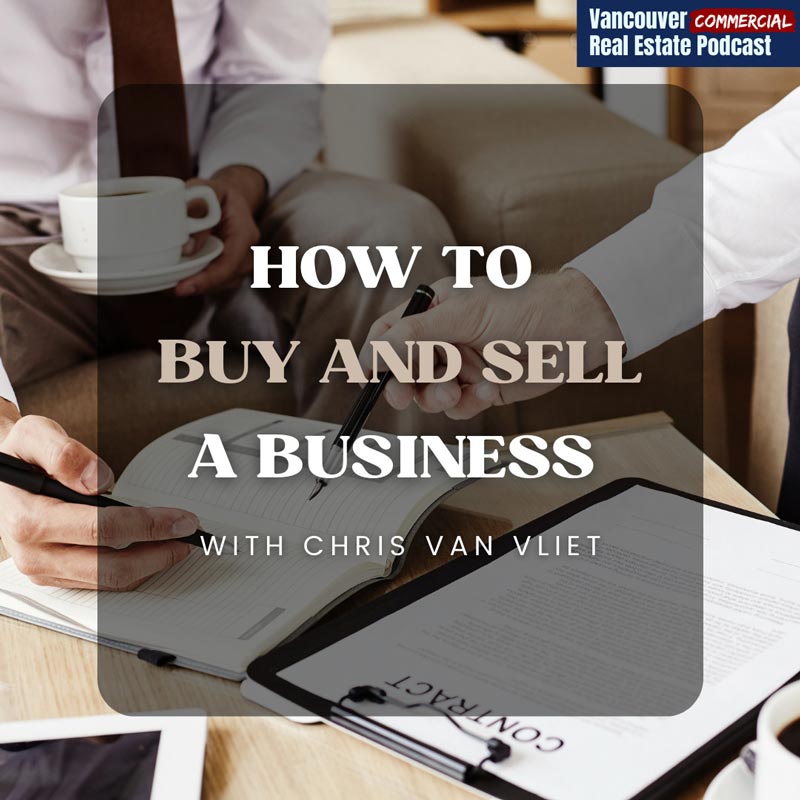
Powered by RedCircle
People may or may not know that business sales and acquisitions fall under the commercial real estate umbrella.
This week, Cory and Matt welcome Chris van Vliet from William Wright Commercial’s Fraser Valley office to break down how you buy or sell a small business. Chris talks us through the timelines, the conditions, and some things you need to be cautious of when navigating through the process.
He also provides his insight on which businesses sell faster than others and exposes the lack of funding available through your traditional banking sector. If you own a small business or ever wanted to be your own boss, this is your episode.
Who is Chris van Vliet?
I’ve been in commercial real estate for over 10 years, working in business sales and acquisitions. I’ve sold over 100 small businesses in my time and it’s one of my areas of experience.
What is a business sale? How do business sales get started?
When a business who wants to sell approaches us, we first meet with them to learn about why they want to sell. We collect information about the business, as well as financial statements and a copy of the lease. We then perform a valuation of the business.
Each industry and business has their own specific type of valuation. We look at things like if the business is profitable, their multiple net earnings, the total revenue, etc.
A lot of first time buyers would need to get educated about how these valuations are made. They would consult with their legal and financial advisors. A more sophisticated buyer would be experienced in the valuation process.
What is the sales process and timeline for a typical business deal?
Typically, it’s not a terribly long process if it’s a small business and a straightforward deal. It would be a couple of weeks of due diligence and a couple of weeks before closing. But due diligence can get drawn out if the buyer needs time to go through things. Depending on the complexity, it could take a couple of months to sell a business.
Another factor impacting the timeline is getting the landlord’s approval to reassign the lease – that’s a deal within a deal. You have to negotiate the assignment of the lease and ensure the landlord is comfortable. That process can take some time.
How do buyers get funding to buy a business?
Getting financing from a bank to purchase a small business is actually very difficult. Most banks won’t lend at all. So typically, buyers look to friends and family, their own savings, or taking equity out of their home or another asset to buy a business. Most of the business deals we do are not subject to financing.
Vendor take-backs are another avenue we work in when it comes to financing deals. The last two business deals I did had vendor take-backs of 100% and 50%.
What is a vendor take-back?
With a vendor take-back the seller is providing a loan to the buyer and acting like the bank. For example, in one recent deal I did, the purchase price was $180,000 and the buyer paid $90,000 upon completion with the remaining $90,000 due in monthly installments over the next two years. So the seller was loaning them the remaining $90,000.
What complications typically come up with business deals?
Financing can be a tricky part of business deals. Some organizations do lend for business deals but there’s specific criteria that must be met. The businesses have to have a good track record of success and the sellers have to be experienced. So you can get financing for a business purchase, but it’s tricky and not that common.
Another challenge with business sales is getting the landlord’s approval. The new tenant has to have strong credit and be responsible and experienced.
How is franchising a business different than just buying a business?
There’s another layer of approval in buying a franchise. Not only would the landlord need to approve of the franchise assignment but the head franchisor would need to approve the new buyer as a franchisee. So that’s an added layer of complexity. The buyer would have to apply directly with the franchise.
If the store is solid, it’s a reputable franchise and the franchisor comes in as a guarantor, that may help the buyer get financing from a place like the BDC.
How is the BDC different from typical banks?
The BDC (Business Development Bank of Canada) has an objective to help finance entrepreneurs’ different ventures, including business sales. So they specialize in this type of lending. Your regular bank branch may not have that kind of experience.
What considerations do buyers need to keep in mind when buying a small business?
There are so many facets to a small business to consider. The brand, the longevity of the business, customer strength and assets are all things to keep in mind. If there are contracts with customers, that’s a plus. Having a lot of equipment and hard assets is a plus and may help with financing since you can use the assets to secure a loan.
Do buyers ever buy a business as well as the property?
It’s not as common but there are business owners who also own their property and look to sell both. We see this more in industrial and manufacturing businesses. There are a lot of owner-occupiers in industrial real estate and in office real estate, but it’s not as common in retail.
What types of businesses are banks most reluctant to finance?
Food and beverage businesses are one of the trickiest to get financing for. They’re tricky businesses in general. A large percentage don’t make it.
We see a lot of deals where an owner wants to sell a failing food and beverage business to an experienced buyer who can come in and save the business.
In terms of less risky businesses, each sector and each type of business has examples of successful businesses that are being run.
Are there a lot of roadblocks to becoming a small business owner?
Yes, there are a lot of roadblocks to becoming a small business owner. But one of my favourite types of buyers is someone who has been in the industry, working for someone else in a management position, and decides to break out on their own. So they have experience managing a similar type of business to the one they decide to buy. They know what they’re looking for and we help them buy that business. Those are usually very successful transactions moving from management to ownership.
What is the impact of rising interest rates on buying and selling businesses?
Since financing is always a challenge for small business deals, it could be even more challenging now with rising interest rates and stricter lending criteria.
But the interesting thing I’ve noticed over the years is that in times of economic uncertainty, I actually see an uptick in business sales. A lot of people decide to strike out on their own, take control and become their own boss when their job is in jeopardy.
What advice do you have for someone looking to buy or sell their business?
Anytime is a good time to buy or sell a business under the right circumstances.
For selling a business, the most important thing is to have it priced correctly. You want to extract the most profit but also have it be attractive to buyers.
For buyers, you need to understand the business and do a lot of due diligence. You want to know what you’re getting into so there are no surprises.
As of October 2022, where would you buy a business?
I would look at something that has sustained itself and been successful over the last three years – a pandemic-proof business. I would look at something I would be familiar and comfortable with, such as something in the retail or service sector, because that’s my background.
There are various businesses that have continued to do well over the last three years and that’s where I’d be looking for myself or when assisting a buyer.
Find out more: Chris van Vliet at William Wright Commercial and [email protected]
For all the curious minds interested in commercial real estate investing, grab a coffee and pull up a chair because we have exclusive stories and tips from commercial real estate brokers, investors, developers, economists, urban planners, and everyone in-between. From the successes and failures to the motivations and lessons learned, the Vancouver Commercial Real Estate Podcast is your insight into commercial real estate in Vancouver, Victoria, Kelowna, and beyond.
What's the best real estate market to invest in? What are the commercial real estate asset classes and property types? Hosted by Cory Wright, founder of William Wright Commercial, and co-hosts Adam and Matt Scalena of the Vancouver Real Estate Podcast, our podcast opens the door to real estate investing for everyone from beginner investors to experienced real estate professionals. New episodes are released every Tuesday. Follow the Vancouver Commercial Real Estate Podcast on Apple Podcasts, Spotify, Google Podcasts, or your favourite streaming platforms.

This communication is not intended to cause or induce breach of an existing agency agreement. E&OE: All information contained herein is from sources deemed reliable, and have no reason to doubt its accuracy; however, no guarantee or responsibility is assumed thereof, and it shall not form any part of future contracts. Properties are submitted subject to errors and omissions and all information should be carefully verified. All measurements quoted herein are approximate.
ⓒ William Wright Commercial Real Estate Services 2024
Proudly designed by Burst Creative